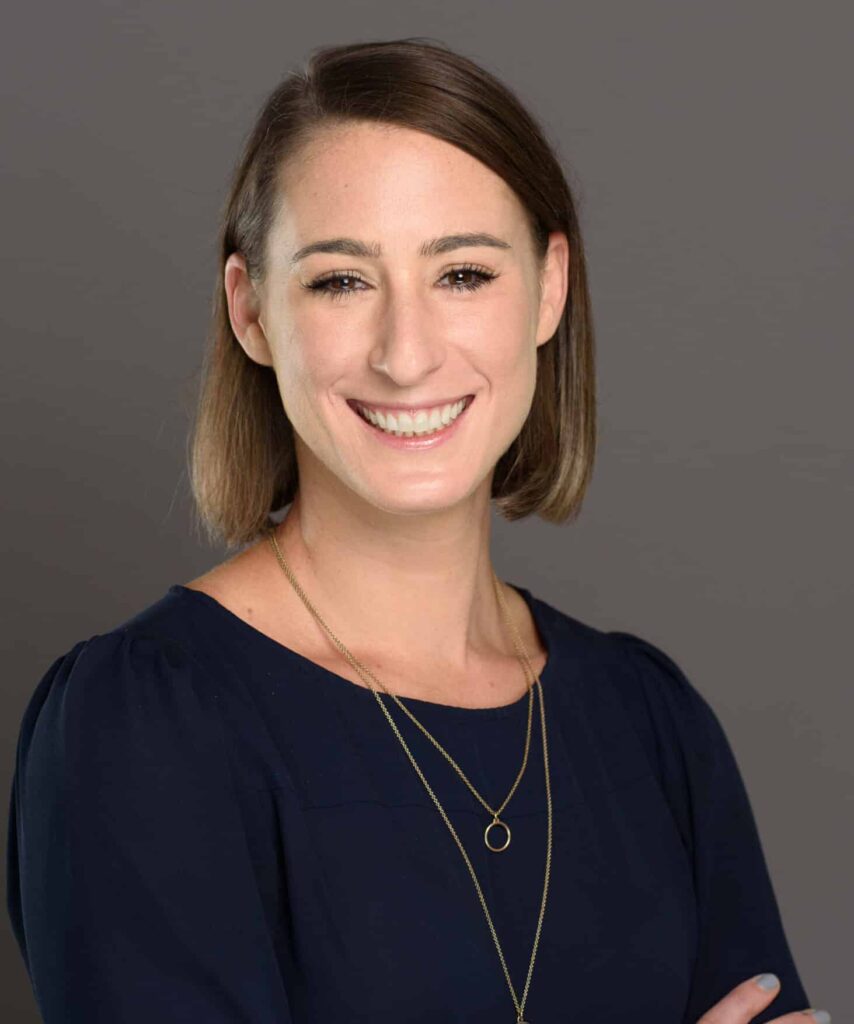My name is Erin Coffman, and I am a sixth-year doctoral candidate in the Department of Nutrition at the University of North Carolina (UNC) Gillings School of Global Public Health. My career in cancer prevention research began almost ten years ago when as a Master’s student in Exercise Physiology, I had the opportunity to work as an exercise interventionist on a clinical trial at UNC Lineberger Comprehensive Cancer Center (LCCC). This was my first hands-on research experience and an up-close glimpse into the numerous issues that survivors face during and after treatment. I also got to witness in real-time the study findings that exercise produced reductions in fatigue, anxiety, depression, and sleep disturbance, and improved physical function and mental health. This experience showed me the potential to apply my knowledge and skillset to make a tangible difference not only for individual survivors, but to enhance the lives of the ever-growing population of cancer survivors.
After finishing my graduate degree, I became a project manager at the Lineberger Comprehensive Cancer Center, under the mentorship of Dr. Ashley Leak Bryant. During this time, I worked on several more studies promoting physical activity among in-patient cancer survivors undergoing intensive chemotherapy. Using activity trackers and electronic Patient Reported Outcome (PROs) measures we evaluated the impact of increased physical activity on changes in self-reported symptoms over time. During this work with acute leukemia patients, I was expecting to encounter a geriatric population and was surprised when I continually came into contact with young adults like me. These patients struck a chord on a personal level because I identified so closely with them, and I would find myself contemplating their unique post-treatment circumstances. In addition to recovering from intensive chemotherapy, they would be navigating the return to college or the workforce, relationships, and life. In an effort to learn more, I was drawn to the work of Dr. Carmina Valle, who conducted one of the earliest randomized trials of lifestyle interventions delivered through Facebook, the first among cancer survivors. I was motivated to pursue a doctoral degree under her mentorship and my shared research interests and goals– to develop and evaluate digital behavior change interventions to improve cancer survivorship and eliminate cancer health disparities.
As a doctoral student and predoctoral fellow with the UNC Cancer Control Education Program, I built on my previous research and academic experiences. I contributed to multiple behavioral intervention clinical trials promoting physical activity, healthy diet, and weight management using connected health technology (wireless scales, wearable activity trackers, health apps) to individualize and tailor feedback while reducing participant burden and maximizing engagement. In May 2018, we launched the IMproving Physical Activity after Cancer Treatment (IMPACT) study, the largest mHealth randomized controlled trial promoting physical activity in young adult cancer survivors to date. As part of this project, I had the opportunity to conduct qualitative interviews with our survivors and was continuously reminded what a resilient and altruistic group we were serving, many of whom expressed wanting to participate in research to help improve care and outcomes for others like them. I had the privilege of hearing their stories as they shared their triumphs and struggles over the year-long study, which came to a close in the Spring of 2020, during the height of the COVID-19 pandemic. Participants were always willing to give constructive criticism and feedback with an eye toward future intervention development. They shared the meaningful ways that improving their physical activity had impacted their lives, from improved fatigue and sleep, to increased confidence to share their data and advocate for themselves with clinicians. These conversations always buoyed my spirits and helped keep me on course.
Another experience that sustained my passion during the difficult year of 2020, was working on the AYA Transitions project, sponsored by the LCCC Comprehensive Cancer Support Program. The goal of this project is to support AYA cancer survivors as they transition from active cancer treatment to survivorship care, providing resources that would be useful during this time. As a member of this team, I helped conduct focus groups to develop a mobile website/app to provide these resources to satisfy the unmet informational and support needs AYA survivors face. These experiences were instrumental in helping me develop and design my dissertation. These AYAs provided invaluable insight and guidance to help translate my knowledge and research expertise into programs and tools that individuals can use to improve their health. Hopefully, these interventions will ultimately be widely disseminated and reduce barriers related to access, cost, time, and convenience for all cancer survivors.
My dissertation research is a culmination of my academic and research pursuits to date. The “Young Adult Cancer Survivors Healthy Eating and Active Lifestyle (YACS HEAL) Study” is an evidence-based pilot randomized controlled trial designed specifically for young adult cancer survivors. Survival rates for adolescent and young adults with cancer, diagnosed ages 15-39, have not improved to the extent that they have for younger children or older adult cancer populations, and young adult cancer survivors often face ongoing physical and psychosocial challenges that are distinct from childhood and older adult survivors. This underserved and understudied population of cancer survivors needs lifestyle interventions designed to meet their needs. The YACS HEAL study aims to test a digital intervention to promote improved physical activity and nutrition behaviors among 80 young adult cancer survivors recruited from around the United States. To be eligible to participate, individuals must be 18-39 years old, diagnosed with an invasive malignancy within 10 years, completed active therapy, with no pre-existing medical conditions that would preclude participation in a remote lifestyle intervention, and not currently meeting ACS guideline recommendations for physical activity and fruit and vegetable consumption. If the proposed aims are achieved, we will expand our understanding of ways to improve health outcomes among AYAs by improving physical activity, nutrition, physical function, and quality of life, and this study will provide preliminary evidence for future trials.
This work would not be possible without the support of organizations like Stupid Cancer. I am most grateful to the young adult cancer survivors who contribute their time, efforts, and lived experiences so generously to advancing survivorship research. Enrollment is ongoing through 2024, find out more and see if you qualify here.I look forward to sharing what I learn with the Stupid Cancer community, thank you for supporting my research!”
By: Erin Coffman

